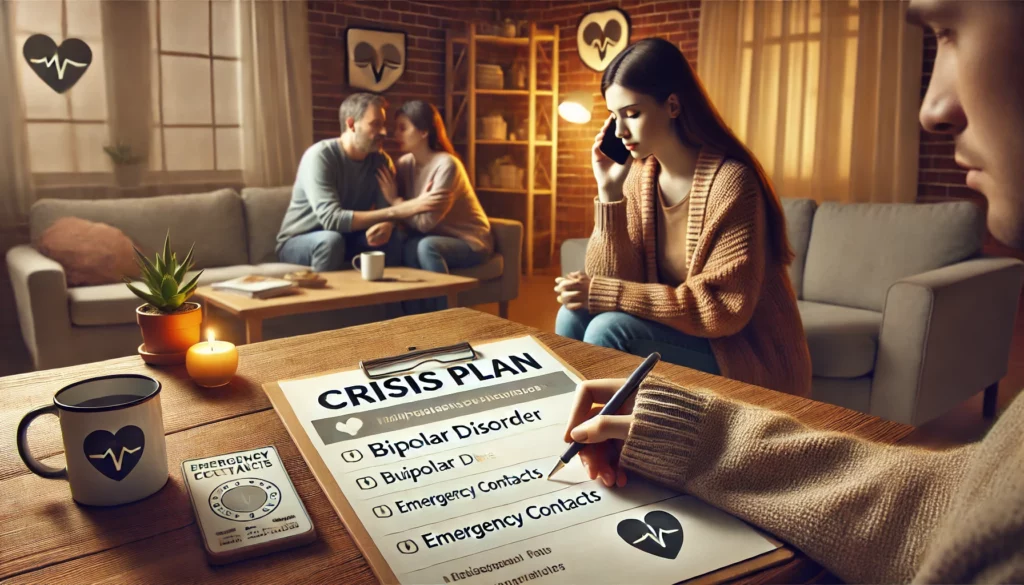
1️⃣ Introduction
Dealing with a loved one suffering from bipolar or unipolar disorder can be challenging, especially during crises. Mood swings, depression, or manic episodes can arise unexpectedly, placing a heavy burden on both the affected person and their social environment. A personalized crisis plan helps relatives prepare for difficult phases, take appropriate actions, reduce stress, and provide the best possible support.
2️⃣ Why Is a Crisis Plan Important?
A structured plan enables quick and safe responses in acute situations without feeling overwhelmed. The benefits of a crisis plan include:
- Early recognition of symptoms
- Reduction of stress and uncertainty
- Clear steps for emergencies
- Better support for the affected individual
- Prevention of escalation
3️⃣ Elements of a Crisis Plan
An effective crisis plan includes preventive and acute measures to ensure quick action in emergencies.
🔍 1. Recognizing Early Warning Signs
Every crisis is often preceded by subtle changes. Common early warning signs in bipolar and unipolar disordersinclude:
Early Warning Signs of Hypomania:
- 🟩 Increased creativity
- 🟩 Restlessness
- 🟩 Loud music, reckless driving
- 🟩 Increased activity, difficulty slowing down
- 🟩 Greater sociability
- 🟩 Increased interest in sex and intimacy
- 🟩 Loss of financial control, increased spending
- 🟩 Talkativeness – speaking faster and louder than usual
- 🟩 Feeling invincible and capable of achieving anything
Early Warning Signs of Mania:
- 🟩 Exaggeratedly elevated mood
- 🟩 Starting many projects but not finishing them due to overwhelming ideas
- 🟩 Racing thoughts and frustration when others can’t keep up
- 🟩 Ignoring daily routines
- 🟩 Very short sleep cycles
- 🟩 Resistance to advice regarding their own behavior
- 🟩 Grandiosity
Early Warning Signs of Depression:
- 🟩 No energy
- 🟩 Low mood
- 🟩 Fatigue and increased need for rest
- 🟩 Everything feels difficult
- 🟩 Lack of interest in things that once mattered
- 🟩 Feeling disconnected from others, relationships feel unimportant
- 🟩 Excessive worrying, lack of self-confidence
- 🟩 Preference to stay in bed all day
- 🟩 Reduced social interactions (avoiding calls, conversations)
- 🟩 Avoiding leaving the house
- 🟩 Avoiding social gatherings
- 🟩 Neglecting daily responsibilities
- 🟩 Neglecting personal hygiene and self-care
- 🟩 Indecisiveness
📋 2. Emergency Contacts and Professional Help
A crisis plan should include a list of essential contacts:
- Psychiatrist/Psychotherapist
- General practitioner or specialist doctors
- Crisis hotlines (e.g., mental health helplines, emergency psychiatric services)
- Family members or close friends for support
- Emergency numbers for urgent situations (e.g., 911, 112 in Germany)
🏠 3. Establishing a Safe Space
- Identify places where the affected individual can find comfort (e.g., a familiar room, nature, meditation space).
- Encourage calming activities (music, reading, breathing exercises).
🗣️ 4. Communication Strategies During a Crisis
- Stay calm: Avoid confrontations or blame.
- Use clear and simple language: „I see that you’re struggling. How can I support you?“
- Set boundaries if destructive behavior occurs.
- Encourage, but do not force therapy; use gentle suggestions.
💊 5. Medication Management
- Ensure that the affected person takes prescribed medications regularly.
- If unsure, consult their doctor.
- Warning: Do not adjust medication doses without professional guidance.
🚨 6. Action Plan for Acute Crises
If the affected person is a danger to themselves or others:
- Seek immediate professional help (crisis team, emergency services).
- Do not leave them alone.
- Communicate in a calm but firm manner.
- If necessary, consider emergency psychiatric care or hospitalization.
4️⃣ Self-Care for Relatives
Relatives must not neglect their own well-being. Self-care tips:
- Set personal boundaries – you cannot handle everything alone.
- Seek support (e.g., support groups, therapy, conversations with friends).
- Take regular breaks – balance your life with hobbies and physical activity.
- Educate yourself about the disorder to feel more prepared.
5️⃣ Conclusion
A well-structured crisis plan can help relatives react appropriately during difficult situations and provide the best support for the affected individual. By recognizing symptoms early, having clear action steps, and prioritizing self-care, crises can be managed more effectively, improving long-term well-being for both the affected individual and their loved ones.